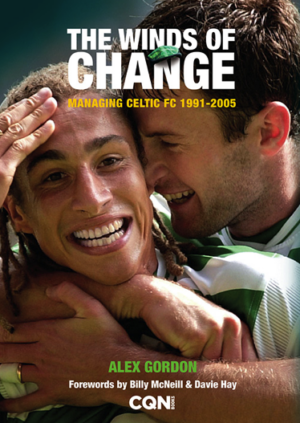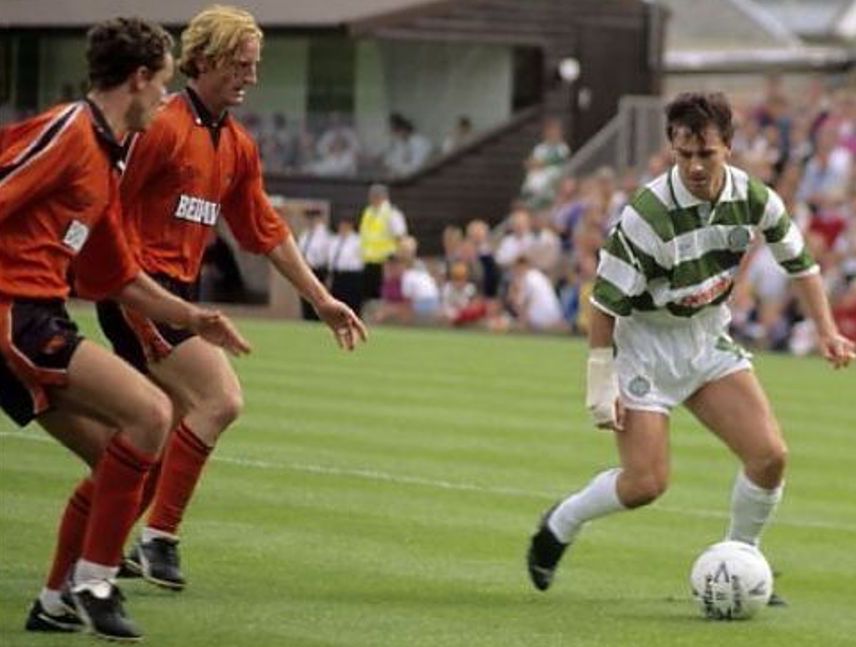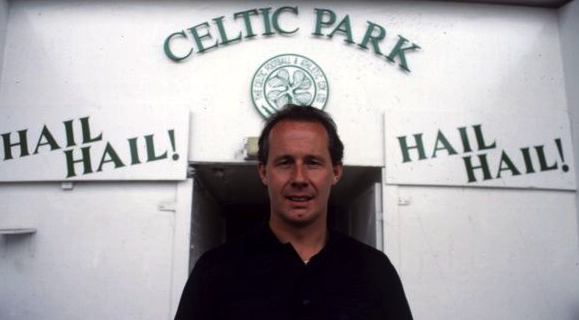LIAM BRADY was named as Billy McNeill’s successor as Celtic manager in June 1991.
The charismatic Irishman arrived with a dream for the club, but his vision had become blurred by the time he departed in early October 1993.
In another CQN EXCLUSIVE series, author Alex Gordon opens his book files to look back at an intriguing and compelling chapter in the club’s history.
Here is another edited extract from Alex’s tribute book, ‘The Winds of Change‘, published by CQN in 2015.
Please enjoy.

NOW it was time for the real deal; Liam Brady’s competitive managerial baptism for Celtic.
It was an intriguing situation as he took his team to Tayside for the opening Premier League encounter against Dundee United at Tannadice on August 10. The Irishman stepped into the dug-out for minute one of his new career while Jim McLean, just a few yards along the touchline, was in his twentieth year as manager of United.
The contrasts couldn’t have been more stark. A crowd of 16,535 were shoe-horned into the ground with Brian McGinlay being handed the refereeing duties.
Brady chose his formation carefully against a team that had completed the previous season in joint third place alongside the Hoops on forty-one points. Pat Bonner, Brady’s former Republic of Ireland team-mate, got the nod in goal with Chris Morris, Derek Whyte, Dariusz Wdowcyzk and Anton Rogan as the back four.
With Paul McStay injured, the mid-three were Stevie Fulton, Peter Grant and John Collins and, in an exceptionally adventurous formation, Tommy Coyne, Tony Cascarino and Charlie Nicholas made up the three-man strike-force.

IT TAKES TWO…Charlie Nicolas is watched closely by Dundee United’s Alec Cleland and Dave Bowman during Liam Brady’s debut match, a 4-3 win for Celtic.
Within seventeen minutes Tannadice was rocking; Celtic were two goals ahead and displaying some devastating and intricate attacking football. The opening goal arrived in the ninth minute and, while it wasn’t the product of any silky soccer or strategies from the training ground, it was still welcoming.
Rogan hurled in a long throw from the left, Cascarino made a nuisance of himself in the penalty box, Coyne flicked it on and Nicholas, only a couple of yards out, steered a header beyond Alan Main. Coyne doubled the advantage with a measured right-foot shot from outside the box with the ball flying low in at the keeper’s left hand post.
Referee McGinlay then awarded United a penalty-kick ten minutes later when he spotted an infringement in the box as Celtic defended a left-wing corner-kick. Michael O’Neill made no mistake with an expertly-taken effort that soared high to Bonner’s left as the keeper took off for his right.
Just on half-time, though, Collins restored the visitors’ two-goal lead. Now, this was a beauty. Collins created it with a swift pass inside to Gerry Creaney, on for the limping Cascarino in thirty-eight minutes, and he laid a return pass into the tracks of the midfielder who launched a left-foot twenty-five yard drive into the top corner.
A platoon of custodians couldn’t have kept that effort out of the net. Jim McLean, the longest-serving manager in the league, decided on a more direct approach after the turnaround. He replaced Hamish French with Mixu Paatelainen and no-one in the ground believed it was to add culture to his forward line. The Finn was an old-fashioned battering-ram of a centre-forward and he lined up with Duncan Ferguson, another front player who would never win awards for finesse.
Within four minutes United were back in the game and Brady must have winced at the ease at which they scored. The defence made a mess of attempting to clear a routine shy chucked in from the left. The ball eventually dropped invitingly for O’Neill to fire low past Bonner.

PARADISE FOUND…Liam Brady at Celtic Park as he prepares for his debut campaign of 1991/92.
Alarmingly, it was all-square in the sixty-eighth minute. David Bowman lobbed over an angled ball from the right and Ferguson, virtually unchallenged in front of goal, rose to sizzle a header beyond Bonner. Clearly, after an excellent start, things were not going according to plan.
In the midst of the impending wreckage, Brady looked calmness personified as he surveyed the scene and sized up the situation from the touchline.
It was obvious Paatelainen and Ferguson were creating havoc with their up-and-at-’em approach. It wasn’t easy on the eye, but United, to be fair, now had twenty-two minutes to turn the contest completely on its head. Whyte and Wdowczyk, two ball-playing central defenders, were being rag-dolled.
Brady couldn’t miss the red flags and, in the seventy-second minute, he put on Mike Galloway for Fulton and the substitute raced directly into the middle of the Celtic rearguard to shore up the defence. It worked a treat. Four minutes from time, Collins nailed the points when Creaney headed down into his path and his first-time left-foot drive thundered past the desperately-diving Main.
‘If all the games are going to be like that, then we are in for a helluva season,’ summed up Brady, almost breathless at the finish. The new Celtic manager, though, had just witnessed the uneven mix that had cost Billy McNeill his job that summer.
Exciting and extravagant going forward; frustrating and exasperating in defence. The midfield was a lot happier on the front foot, too. Celtic could score goals, but, as Brady had just experienced, they could chuck them in with a frightening generosity at the other end, too.
* TOMORROW: Don’t miss the next riveting instalment of the Liam Brady story – only in your champion CQN.

